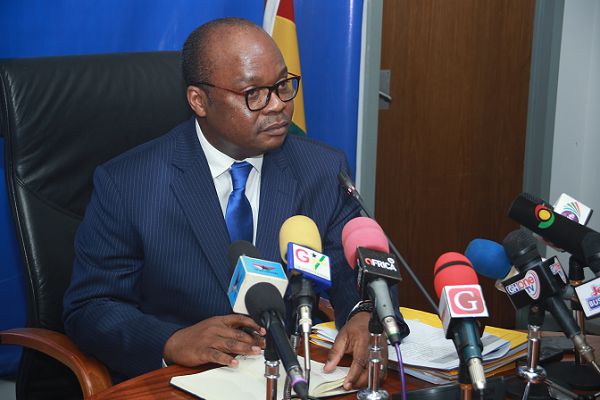The Monetary Policy Committee of the Bank of Ghana kept the policy rate unchanged at 16 per cent for the fourth session in a row, citing inflationary pressures.
Addressing a press conference in Accra on Friday, September 20, Dr. Ernest Addison, the Governor, said the Committee observed that the pace of disinflation had slowed and expectations showed some uptick in August 2019.
“On inflation, the Committee’s view was that the pace of disinflation had slowed somewhat. The recent underlying inflation trends gauged by the core inflation and weighted inflation expectations all showed some uptick in August 2019.
“This gives some indications of emerging pressures coming mainly from the recent upward adjustment of utility tariffs, ex-pump prices and transport fares,” he said.
Dr Addison said the fiscal situation remained a concern and strengthened efforts would be needed to close the deficit gap.
He said the Committee was concerned about the continued revenue weakness, which requires expenditure adjustments to contain a larger than projected budget deficit.
This will help underpin investor confidence in the Ghanaian economy and reduce the burden on monetary policy.
“Global conditions and inflation developments at home have created some policy space for monetary policy which, however, cannot be exploited in the current circumstances,” he said.
“Looking ahead, it is expected that the full implementation of the new tax measures will likely impact revenue performance in the last quarter to help achieve the fiscal deficit target set for the year,” he added.
He said the Committee observed that growth remained strong and the medium-term outlook was positive.
The medium-term outlook is expected to be driven by improvements in business sentiments, and expectations of increased production in the oil and gas and mining sectors, and the continued implementation of growth-oriented government flagship projects.
Dr Addison said provisional data from January to July 2019, showed that total revenue and grants amounted to GH¢ 26.8 billion (7.7 percent of GDP) compared with the envisaged target of GH¢ 31.8 billion (9.2 percent of GDP).
The revenue shortfalls were mainly from international trade taxes. Total expenditures and arrears clearance grew, in year on year terms, by 22.4 percent to GH¢ 40.4 billion (11.7 percent of GDP), marginally below the target of GH¢ 42.9 billion (12.4 percent of GDP).
These developments resulted in an overall budget deficit (on a cash basis) of 3.9 percent of GDP against the target of 3.2 percent of GDP.
In line with these developments, the stock of public debt rose to 59.4 percent of GDP, which is GH¢ 205.6 billion at the end of July 2019 compared with 53.1 percent of GDP (GH¢ 159.7 billion) at the end of July 2018.
Of the total debt stock, domestic debt was GH¢ 98.4 billion (28.4 percent of GDP), of which GH¢ 10.7 billion (3.1 percent of GDP) represented bonds issued to support the financial sector clean-up, while external debt was GH¢ 107.2 billion (31.0 percent of GDP).

